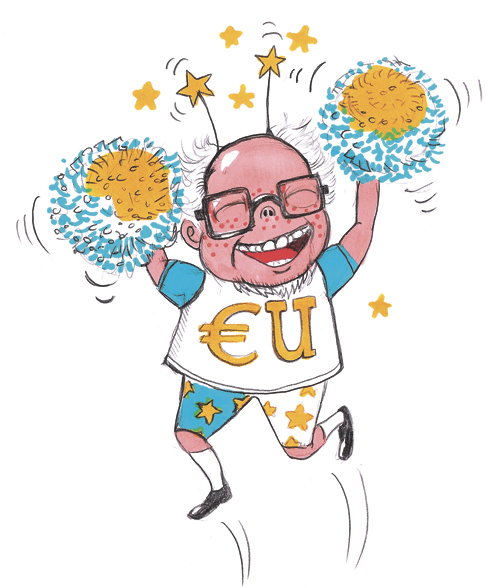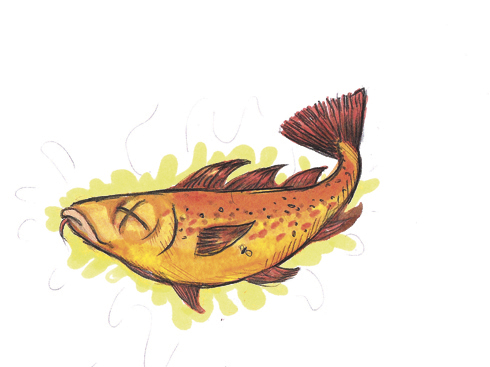Later this June—this autumn at the latest—Iceland is set to become a full candidate for membership of the European Union. An application to join was sent to Brussels in July last year, and now formal negotiations on Iceland’s membership are due to begin. However a majority of the nation is opposed to joining the EU; a membership treaty would probably be voted down in a referendum.
For the last two decades, Iceland has belonged to the little known European Economic Area. The EEA was originally a treaty between the EU and countries that had belonged to EFTA, the European Free Trade Association, originally founded in 1960. Soon, three of the main EEA countries, Austria, Sweden and Finland, left to join the EU. Iceland stayed behind with Norway and Liechtenstein.
Partial membership
According to the EEA Treaty, Iceland is part of the EU in many ways. It enjoys free trade with the EU and subscribes to the “four freedoms,” the free movement of goods, persons, services and capital. As a counterpart, the EEA countries are obliged to adopt many of the laws of the European Union without having any part of the decision making process in Brussels. They also have to contribute financially to the single market—well, rich Norway pays a lot, Iceland not so much.
Since 2001, Iceland also belongs to the Schengen Agreement, which entails a borderless zone covering 25 European countries. In this sense Iceland is more ingrained within the EU than the UK and Ireland, who decided not to participate in Schengen.
A strange balancing act
So in many ways Iceland has been integrated into Europe over the last decades. It is now much more a part of Europe than it was in the time when the Americans operated a large military base in Keflavík, while the country was at the same time doing lively trade with Russia—trading herring and wool for oil and Russian cars, a common sight on the streets of Reykjavík in the sixties and seventies. This was a strange balancing act, which can be explained by the relative strength of communists in Iceland after the Second World War.
One of the touchiest matters in post-collapse Iceland are the UK and Dutch branches of the Landsbanki bank’s Icesave savings accounts, which will probably have to be reimbursed by Icelandic tax-payers. This matter will be settled according to European law and perhaps ultimately in a European court. The regulation of the now defunct Icelandic financial market mainly came from Europe—even if it was not always heeded.
Questions of sovereignty
Icelanders’ view of the EU is quite paradoxical. The key word is sovereignty. As previously stated, Iceland adopts much of the EU legislation, but has absolutely no say in it. For an independent country this might seem intolerable. Iceland has to lobby in the corridors of Brussels against EU legislation that might prove harmful for the nation’s interests, but then again Iceland doesn’t really have the clout to influence decision making in Brussels.
Many would claim that Iceland really gave up much of its sovereignty when it joined the EEA, and that it would have been normal to hold a referendum on the treaty and to alter the constitution correspondingly. In retrospect this seems to be right. However, even those who opposed the EEA in the beginning soon accepted it. Belonging to the EEA was obviously a factor in the good times enjoyed by Icelanders in the era leading up to the economic collapse of 2008.
Anathema to leftists
EU membership divides the nation—and the debate is set to become very tough. The politics of the matter are quite complicated. Only one party is absolutely in favour of joining the EU, The Social Democratic Alliance (Samfylkingin)—the party of PM Jóhanna Sigurðardóttir—presently parliament’s majority party, and the most internationally minded of the Icelandic political parties. When the current left wing government was formed in the spring of 2009, the Social Democrats were adamant that a EU application would be high on the government’s agenda.
This was very awkward for the junior party in the government, Vinstri-Grænir (‘The Left Green Party’), most of whose members oppose the EU. But the Left Greens reluctantly went along, knowing that otherwise they might be left out of the coalition government. So the social democrats triumphantly sent in an application last summer—and now the formal negotiations are set to begin.
In the present climate of total mistrust in politics—a joke party recently won 35 percent in the Reykjavík municipal elections—this is a very difficult matter to resolve. The leaders of the Left Greens are accused of having betrayed their electorate by agreeing to the EU application. This is one of the reasons why the party, which looked so coherent in opposition, is now in a state of total disarray. Another one is that its chair, Finance Minister Steingrímur J. Sigfússon, is perceived as kowtowing to the IMF, which is anathema to the leftists in his party.

Europhobia
The right wing Independence Party, historically the largest party in Iceland, is divided on the EU. It has a very loud, somewhat xenophobic, fraction that absolutely detests the EU and everything connected with it. The level of Europhobia is comparable to what you would find on the extreme fringes of the British Conservative party. This is led by Davíð Oddsson, former Prime Minister, then Central Bank Governor, who, surprisingly—given that he was one of the main actors of the collapse—is still around, now as editor of the daily newspaper Morgunblaðið.
The party also has a pro-Europe wing, but this is much more muted; the EU fraction is cowed by the shrillness of the Eurosceptics. The party’s chair, Bjarni Benediktsson, is very indecisive, though he appears to be more against than for. For membership to be accepted by the parliament and the nation, it is thought imperative that at least a part of the Independence Party be in favour. In due time the party might even split on the issue, but at the moment the Eurosceptics have the upper hand.
The Independence Party is traditionally the party of power in Iceland, the party of business, and it still represents business interests, even if it made a terrible mess of things before the crisis. The attitude of the business community towards the EU is complicated. Basically industry, technology and commerce are for joining, whereas fisheries and the agriculture industry are strongly against it. The fisheries and farming lobbies are very strong within the political parties and in the media.
Lack of leadership
The Eurosceptics within the Independence Party are demanding that the membership application be withdrawn, and some of the Left Greens agree. However this will hardly happen if the present government holds out, and even if it falls it might be considered too late or undiplomatic to withdraw the application. So the process muddles through. Brussels knows that there are doubts and that a future treaty might be voted down—in a recent poll up to 70 percent said they would vote no in a referendum.
The main obstacles in the negotiations with the EU are fisheries and farming, as well as currency matters. Through the EEA Treaty, Iceland is very integrated into Europe so other matters are quite easy to resolve; much of the legislation has already been adopted. But this is also a question of leadership: the present leaders of The Social Democrat Alliance are not great thinkers or charismatic people, and they seem to be unable to counter the anti-EU forces with arguments that might sway the public opinion.

The myth of the Siege
Throughout the Cold War, Iceland was in the US camp. The Americans even bought fish we could not otherwise sell. Then the Americans left, and the military base in Keflavík is now a ghost town. It didn’t even help that then-PM Davíð Oddsson sang a birthday song for George W. Bush in the White House, a cringe worthy moment. At the time of the collapse, Iceland felt it had no friends. Nobody wanted to lend us money to save the economy—which would have been to late anyway, considering the magnitude of the cock up.
Scandinavia said no, and the US didn’t seem to care. Mervyn King, governor of The Bank of England, offered the help of central banks to reduce the size of the banking system. This was not heard of until recently—an amazing blunder on the half of the Icelandic Central Bank and the government. One of the more rampant Europhobes even wrote a book called The Siege, claiming that Iceland had been betrayed by its former friends. The Special Investigative Committee’s report does not bear this out; in 2.000 pages it maps the collapse and concludes that we Icelanders mostly have ourselves to blame through allowing our banking system to become twelve times the size of the GDP, by the overvaluing of our currency and by immersing ourselves in debt.
The Russian loan
We’ve had some very strange events occurring lately. In October 2008, during the last days of the collapse, Davíð Oddsson, then-governor of the Central Bank, appeared in the media claiming that the Russians had offered to lend Iceland a huge sum of money, maybe enough to see us through the crisis. Geopolitically, this would basically have amounted to the Russians buying up the country, but all the same, the news was surprisingly well received. However, some drew a link between this and alleged Russian involvement with the Icelandic financiers; a bit later former oligarch Boris Beresovsky said on Sky News that the Icelandic banks had been used to launder dirty money from Russia.
In the end the Russian loan turned out to be a fantasy, and the Russian economy soon found itself treading in deep water. This demonstrated how unsure the Icelanders were of their place in the world. Russians were perceived as an alternative to the EU and the IMF. There is a local saying originated by Nobel laureate Halldór Laxness, Iceland’s greatest writer, who has one of his heroines exclaim: “If I can’t have the best man, then let me have the worst one.”
The Chinese show up
Strange things are still happening. A few days ago a delegation of Chinese leaders, fronted by a top politburo member, showed up in Reykjavík, drove around town in a big mobile convoy and doled out credit to the Icelanders. Their visit had not been announced in advance, so this was a bit of a surprise. The Chinese also have a very big embassy in Reykjavík. Many ask in light of Iceland’s vulnerable position: What do the Chinese want from this small nation here in the high north?
Vicious debate on Europe
Back to Europe. It has been proposed, notably by former leader of the Social Democratic Alliance Ingibjörg Sólrún Gísladóttir, that the EU application be put on hold for some years. This might be a clever compromise in light of the very volatile political situation and also because Europe at the moment, with its Euro crisis, seems to be in a mess. It is quite unclear where the EU will go from here, whether the Eurozone will break up, or if we will see a more centralised economic regime in Europe.
There are signs that the debate on Europe will become extremely vicious. Icelanders are not very good at discussing ideas; arguments in this country very quickly become very personal. Attempts at reform, badly needed in a country riddled with debt, are being blocked because they are perceived as being part of the EU programme. It must be said, one is apprehensive about having to listen to this debate for the next years—a referendum on the EU, which will be held after a treaty has been concluded, will surely divide the nation.
More on the EU:
Sophia on the EU
Former Morgunblaðið Editor Styrmir Gunnarsson on why Iceland should not join the EU
- Illustrations: Lóa Hjálmtýsdóttir
Buy subscriptions, t-shirts and more from our shop right here!
















